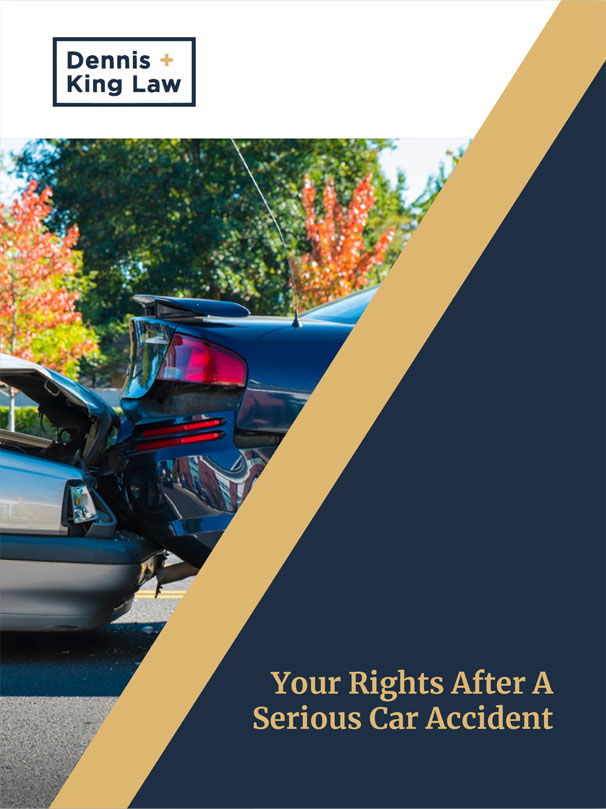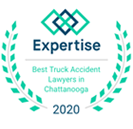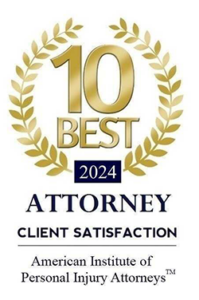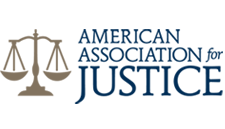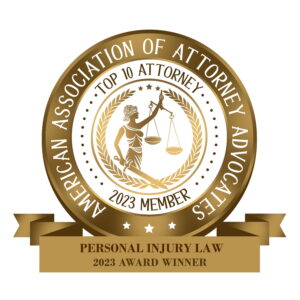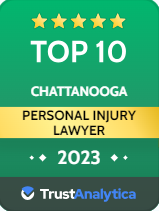Who pays for injuries after a rear-end auto accident? Following is some important information to know in order to get fair compensation from the car insurance company.
Rear-end collisions injure more than 556,000 people annually. It is important to know what to do after a rear-end collision, and how to avoid mistakes that will inhibit making a successful insurance claim. This guide can help individuals get the compensation they deserve.
What is The Meaning of “Rear-End Accident” or Getting “Rear-Ended”?
The terms “rear-end accident” or getting “rear-ended” refer to a motor vehicle collision that occurs when the front bumper of one vehicle crashes into the rear end of another vehicle. Although the tailing driver is usually at fault in these accidents, either or both parties can be found liable for negligence. Rear end accidents commonly involve:
- distracted driving;
- speeding;
- drunk driving; and
- icy or otherwise slippery roadways
To obtain compensation in a rear-end crash, you must show that the other driver was negligent. An experienced motor vehicle accident lawyer can review your case to determine fault, gather evidence to substantiate your claim and negotiate with the insurance company for the maximum possible settlement. At Dennis & King, although we always strive to settle rear-end accident claims outside of court, we are prepared to take your case to trial if necessary. Contact us today for a free and confidential consultation about your case.
Causes of Rear-end Accidents
It is nearly impossible to avoid a rear-end collision. They happen in a variety of ways:
- Tailgating: Georgia and Tennessee require drivers to “follow, allowing yourself at least three second for stopping before hitting the car in front of you is a “safe stopping distance.” Of course, bad weather, bad road conditions, or poor visibility require even longer stopping distance.
- Distracted driver: Cell phone usage, eating, putting on makeup, listening to loud music, talking with passengers, looking into the back seat to check on young children, and looking away from the road cause the majority of rear-end accidents.
DUI: Drugs and alcohol impair a driver’s reflexes and reaction time. Intoxicated drivers cannot judge accurately distance or speed, and actually may nod off while driving. - Weather: Rain, snow, slush, ice, high winds, and fog can affect a driver’s ability to see ahead, to stop in time, and to stay within the lane.
Sudden stops: Sudden stops contribute to a rear-end collision, but usually it is not a reason to put all the blame on the driver of the stopping car. Many reasons cause a sudden stop, such as avoiding a dashing out child or animal, road conditions, a sudden accident, or construction.
Common Rear-end Collision Injuries
Every vehicle collision potentially can cause fatal injuries-even rear end collisions. However, rear end collisions usually cause “soft-tissue” injuries. These injuries are things like sprains, strains and bruises.
- Whiplash is a common outcome of rear-end collisions. Doctors and lawyers use this term to describe pain and stiffness in the neck as well as shoulder area-the sudden and violent jerking movement or snap of the neck, shoulders and spine well beyond their normal range causes this condition. Doctors also refer to this condition as hyperextension and hyperflexion. The neck movement is like the motion of a whip as it snaps, giving the condition its name.
Rear-end collisions cause about one-out of five victims to suffer a whiplash injury. About eighty percent of these whiplash sufferers will experience pain and soreness longer than a week. Fifty percent have pain and soreness for more than a year. - Back Injuries from the sudden impact of a rear-end accident often are extremely painful. Even a low speed impact can compress the lower spine and the disks between the vertebra. Not surprisingly, rear-end accidents commonly cause back injuries such as herniated or bulging disks.
- Face and head injuries do not just happen in high-speed crashes. Even rear-end accidents at speeds less than twenty miles an hour can cause face and head injuries.
A slow-speed collision, even when airbags do not deploy, can throw one’s face and head into the steering wheel or other parts of the interior parts of the car. Collision forces can break noses, fracture cheeks, break jawbones, and detach retinas. Facial cuts and bruises can also occur. Additionally, where the airbag bursts open, its force can cut the face and scalp, or worse. - Hand and arm injuries can happen to the driver and passengers either from bracing during the impact or the collision force throwing them about the interior of the car. Exploding airbags almost always cause arm and hand injuries.
- Seatbelts instantly and firmly hold the torso in place when a collision hits the car from any direction. This is important because it keeps the collision from causing more serious injuries. However, this does not mean that a seatbelt does not affect the body. A rear-end collision slams the body forward, causing it to hit the safety straps. More often than not, the results are bruises and scrapes to the shoulders, neck, and torso.
Who Pays For A Rear-End Collision?
After an auto accident, one expects compensation for property damage and personal injuries. Most of the time, the police and the involved car insurance companies assign fault to the rear-end accident. Individuals who have suffered an auto accident will file a liability claim with the at-fault driver’s insurance company.
Comparative Negligence
The majority of the time, an insurance company accepts full responsibility when it has insured another car. However, sometimes the insurance company will go straight into disagreeing with the injured party on the value of their injury claim.
There are times when the insurance company will try to put some or all of the blame on the injured party, even though their insured caused the rear-end accident to occur. This is always the case if the brake lights of the injured party failed to work and the driver behind claims he or she could not see the injured party, hence leading to the accident.
If an insurance company tries to blame part of the fault on the injured party, the injured party must speak to an attorney. Do not simply take the insurance adjuster’s word on the matter.
Tennessee and Georgia have comparative negligence laws, meaning the injured party can pursue compensation from the other driver even if they partly contributed to the accident occurring. A jury may reduce the injured party’s compensation by some degree to account for their share of fault. In these cases, an attorney can help prove that the injured party had no responsibility for the crash.
There are few exceptions to rear-end liability, such as:
- If the driver in front drove erratically or recklessly, making it impossible for the driver behind to avoid a collision, even from a safe distance behind
- If the driver in front suddenly stops in the lane of traffic and fails to set out flares or give any other reasonable notice to the driver behind
- If the driver behind is traveling a safe distance and at a safe speed, but fog, snow, rain, or other inclement weather conditions make it impossible to stop
- If a driver behind is traveling at a safe distance and speed behind the vehicle in front, but a third vehicle strikes the driver from behind, pushing the second car into the first vehicle.
Be Prepared To Prove The Rear End Collision Insurance Claim
It may seem obvious that the driver who hit the injured party from behind caused the accident. However, do not just sit back and wait for the money to appear. The insurance adjuster does not earn a year-end bonus by automatically handing out fat settlement checks.
It helps to know some terms used in insurance claims:
- Liability means fault or responsibility. The at-fault driver is usually responsible or liable for damages to the injured party caused by the rear-end collision.
- Negligence happens when a driver fails to act responsibly or does something no reasonable driver would do, like tailgating.
- Damages for rear-end accidents can include property damages to your car, and personal injury damages like medical and therapy costs, out-of-pocket expenses, lost wages, and pain and suffering.
- Proximate Cause is an action that leads to damages which wouldn’t have otherwise happened. The injured party would not be suffering from whiplash if they had not been rear-ended.
- Duty of Care means the obligation to be careful and avoid causing harm to others
All drivers have a legal duty of care to drive safely. This means drivers must follow local traffic laws, maintain a proper lookout for other drivers and pedestrians, and keep their cars in working order.
When a driver violates their duty of care, it is often because of negligence. A rear-end collision can happen when someone stops paying attention, drives recklessly, or brakes failed because they failed to properly maintain their vehicle.
When negligence causes a rear-end accident, one has a right to compensation for damages. It is up to the injured party to provide evidence of the other driver’s negligence, and proof of their injuries.
The injured party will need to prove the collision led to injury and the extent of their losses from these injuries.
Gather Evidence To Win Your Claim
To meet the burden of proof, one must gather as much evidence as possible to show the other driver’s negligence. The more evidence gathered, the better the chances are of winning. Here is some of the best evidence for a rear-end auto accident claim.
Evidence at the Scene
Always call 911 when involved in a traffic accident. Tell the dispatcher the location of the accident, if anyone is injured, and if there are traffic problems or dangers at the scene.
If physically able, begin to gather evidence while waiting for police:
Photographs: Use a phone or whatever device is on hand to take photos and video. Start with pictures of the cars and the surrounding area. Take as many pictures, from as many angles as safely possible. Take close-ups and wide shots to include traffic signs, stoplights, and other information in context with the accident.
If a police officer is administering a field sobriety test to the other driver, use a cell phone’s video function to record the test from as close as possible. Also, photograph empty beer bottles or open containers of alcohol in and around the driver’s car.
Witness statements: Write down the names and contact information of anyone who saw the accident. If there are willing witnesses, have them write down everything they saw and heard. Ask them to sign and date their written statement.
If the witness does not give a written statement, ask permission to record their statement using a phone. Be sure they mention their name and contact information on the recording.
Continue to Collect Evidence
Detailed Notes: After the collision, make detailed notes about what happened before, during, and after the at-fault driver rear-ended you. Write down anything the other driver said.
Statements like “I didn’t see you in time to stop,” or “I was on my cell phone,” are considered admissions against interest and are strong evidence of negligence.
Police Report: If the police respond to the accident, an officer will investigate the accident and prepare an official police accident report. The report will indicate the investigating officer’s opinion of fault for the crash, list any citations issued to the other driver and if the other driver was arrested for DUI.
Medical Records: Medical bills and records are crucial evidence proving the rear-end collision led to injury and how badly. Insurance companies are highly suspicious of whiplash cases because whiplash injuries are diagnosed mainly by the injured party’s complaints. One will need good medical documentation from a trustworthy doctor.
State away from “personal injury” chiropractors, who will run up bills with excessive tests and questionable repeated treatments. These bills are often so unreasonably high that the insurance company will not reimburse them fully, leaving the injured party to personally pay the remainder. Insurance companies are only required to pay “reasonable” costs, based on commonly accepted standards of medical care.
Take pictures of injuries immediately following the crash and throughout the recovery, including pictures of bruises caused by the seat belt or air-bag.
The total cost of medical bills and related expenses are an important part of calculating the value of one’s claim.
Frequently Asked Questions About Rear End Car Accident Collisions
Is it worth getting a lawyer for a rear-end accident?
If you have experienced any damages, including personal injury or property damage, it is in your best interest to seek legal counsel after a rear-end accident. A lawyer can help you get the maximum compensation available in the quickest, most economical manner possible.
Are you automatically at fault for a rear-end collision?
Although most rear-end collisions are caused by the person in the rear vehicle, the driver of the front vehicle can also be at fault. An experienced rear-end collision attorney can help to determine fault and gather evidence to substantiate your claim.
If someone rear ends you, who’s insurance do you call?
Immediately following a rear-end collision, it is important to call 911, exchange contact and insurance information with the other driver, seek immediate medical treatment, and consult with an experienced car accident attorney. You must also notify your insurance company within a reasonable time period, but it’s a good idea to speak with your attorney first.
When An Attorney Is Needed
Considering that most personal injury lawyers are paid on a contingency basis—meaning they only get paid if you do—it always makes sense to consult with an attorney following a motor vehicle accident. Unfortunately, there are countless “settlement mills” out there, taking advantage of the vulnerability of injury victims. As a result, it is important to do your homework before hiring a lawyer to represent you after a rear-end crash. Ask for referrals, research potential candidates online, and interview at least one or two attorneys before deciding who to hire.
If you have been injured in a rear-end accident, it is important to work with an attorney who actually spends time getting to know you and your case, and who is prepared to go to trial if it becomes necessary. At Dennis & King, we will never settle your case for less than full value. Our experienced car accident lawyers are well known and respected by the big insurance companies, and we offer premium services at an affordable rate. Furthermore, although we always try to reach a settlement outside of court, we are prepared to take your case to trial if necessary.
Contact Dennis & King Today For a Free Consultation
There is too much at stake to handle complicated injury claims alone. Furthermore, there is no cost to find out what a skilled attorney can achieve. For more information, call Dennis and King today at 423-892-5533 or contact us online now.
 500+ five star reviews
500+ five star reviews